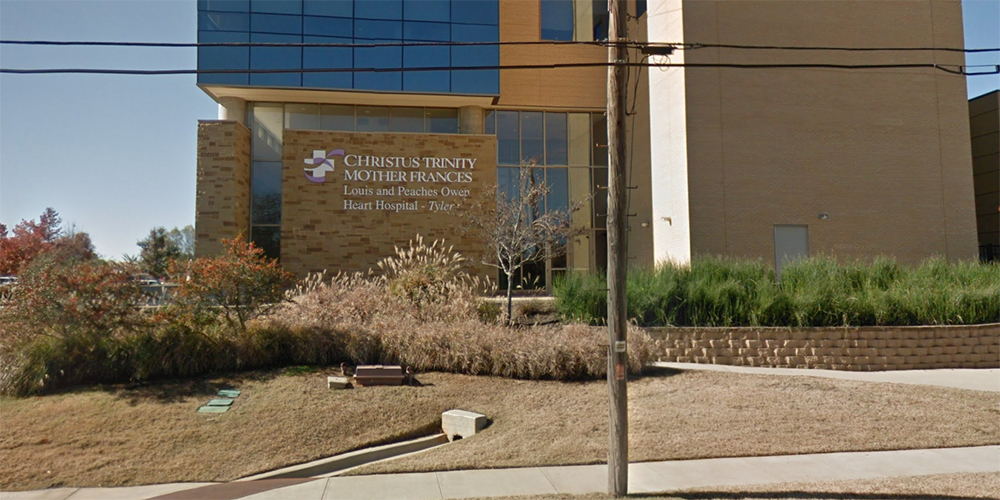TYLER, Texas — Medical personnel, including physicians and nurses, testified against a man accused of killing four patients while he was a nurse at Christus Trinity Mother Frances Louis and Peaches Owen Heart Hospital.
According to 2018 and 2021 indictments, William George Davis, 37, is accused of injecting air into the bloodstreams of patients recovering from heart surgery, causing them to have stroke-like symptoms. Davis is facing capital murder charges for the deaths of Ronald Clark, Christopher Greenaway, Joseph Kalina and John Lafferty. He is also charged with aggravated assault for allegedly causing injuries to patients Rickie Glenn, Pamela Henderson, Gary Parker and James Wages, reports The Marshall News Messenger.
On several occasions, Davis can be seen on surveillance footage entering the rooms of some of the patients moments before their medical conditions worsened, according to his arrest affidavit. Investigators also confirmed through hospital records that Davis was working the nights of all incidents in question.
During the first day of the trial, Dr. Charlie Crum, a radiologist, testified the scanned images of the four deceased victims’ brains were rare to see and that each scan showed a similar pattern of air on the brain, according to The Tyler Paper. He also testified that his first thought was to talk to one of the nurses who cared for the patients since the air could not have been placed into the brain accidentally.
Greenaway died after suffering a neurological event following a routine surgery on Aug. 4, 2017. The nurse assigned to Greenaway allegedly asked Davis to keep an eye on his patients while he went to lunch. When the nurse returned 30 minutes later, Greenaway was brain dead. Kalina experienced a similar medical event on Jan. 25, 2018, leading to severe brain damage. He died two years later.
Crum further testified that Lafferty and Clark’s brains showed similar patterns of air and injury inside. Clark was recovering from surgery on July 26, 2017, when air inside the arterial system of his brain caused damage and his body shut down. He died a few days later.
On Sept. 29, anesthesiologist Rigoberto Ramirez testified that he reviewed Clark’s status ahead of him receiving anesthesia and that he wouldn’t have expected Clark to have an unexplained neurological event after his surgery.
Dr. Joseph Kuria, another anesthesiologist, testified that Clark was ruled neurologically intact, was doing well, and was cleared for discharge after his surgery. A former registered nurse at Christus also testified that Clark rated his pain at a two out of 10 after his surgery and that he was speaking clearly with no slurred speech. Based on her documentation and notes, the nurse said there was no concern for Clark’s recovery.
The next day, security footage shown to the jury revealed Davis was in Kalina’s room about three to four minutes before a fellow nurse called for help when his condition began to decline. Based on the footage, Davis’ defense attorney Phillips Hayes noted there were other nurses in the area near Kalina, not just Davis.
Wendy Stone, a registered nurse in the hospital’s cardiovascular ICU, testified that to her knowledge, Davis didn’t tell anyone he was in the room before Kalina’s complications. Stone also testified that working with the arterial line is a practiced, common routine for nurses and that they are careful to make sure there is no air in the line.
On Oct. 4, Deb Chelette, vice president of operations and cardiac services, testified there were inconsistencies between Davis’ recollection of what happened to Kalina. Chelette said she saw Davis entering and leaving Kalina’s room and that based on security footage, he was the last person to see Kalina recovering well.
Chelette told the jury that security footage showed Davis come to help Kalina and other nurses five minutes after complications began, noting that five minutes could be the difference between life or death.
“I was concerned enough to know that I had a gut feeling,” she said. “That told me something was wrong from a nursing practice perspective.”
Davis has been held in the Smith County Jail since April 2019 on bonds totaling $8.75 million. In Texas, if found guilty of capital murder, a person either faces the death penalty or life in prison. In 2020, the Smith County District Attorney’s Office said it intends to seek the death penalty in Davis’ case. Testimony is expected to last four to six weeks.













